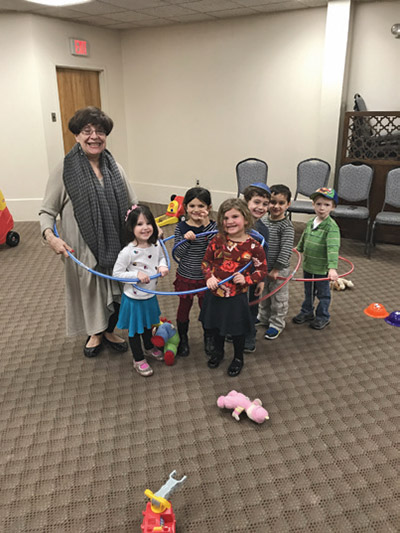
Parents and friends of the Leah Sokoloff Nursery School of Shomrei Torah in Fair Lawn enjoyed an evening of conversation with LSNS Educational Consultant Esther Feil, on the timely topic of “iPhone, iPad, I Want to be a More Present Parent.” Parents today are faced with a world of rapidly increasing technology together with constant demands on their time. But what makes the job of parenting even harder is that while our children may also be plugged into their devices, what they are really watching is their parents.
Today it is possible to be a present, yet absent, parent, which is negatively affecting our children. Children need to feel a sense of self-esteem and worthiness of a parent’s love and attention, the opposite of which is the fear of failure or of being alone and abandoned. Children are social beings and they need physical connections. How many times do we see parents with a cell phone in hand while in the supermarket with their children? How often are we ourselves that parent? A parent on the cell phone has no idea what interests the child. As parents, we can expand our child’s curiosity but not while on the phone or the computer.
Mrs. Feil assured parents that while we need to be present 24/7, we don’t have to be perfect. She offered suggestions as to how to be more present parents. Set aside even a few minutes a day where there are no screens or devices. Enter into conversation with children and engage them physically, intellectually and emotionally. Establish small routines to show children love. We need to assure children that we, as their parents, are always available for them. We must model for children a value for their effort and not for what they produce. Children today are faced with more expectations at an earlier age. In order to grow, children need to take risks. They must know that their parents are their “safety valve” and that we are here when things don’t always work out the first time.
Parents must make time for children. If parents can’t take the time that moment, then assure the child, with a time line if needed, as to when you will be available. Parents shouldn’t be afraid to say “no” but must ensure that children understand that it is for their safety and well-being. Sometimes we say “no” without a reason, but having built up a track record of explanation for the “no,” a child will accept it even if he doesn’t like it. To a young child, the word “no” takes away his sense of control. It’s wonderful when you can give a child the opportunity to say “no.” You can ask her if she wants worms for breakfast, to which she will most likely respond “Noooo” with great delight!
Mrs. Feil encouraged parents to live in the real world and not in the “virtual world.” We can’t keep children in a bubble, nor should we attempt to. The real world can at times be scary, but it is also fascinating and exciting. Children learn best in a three-dimensional world. If a child only looks at something like a tomato on a flat screen but never holds, peels or smells it, we have taken away a layer of the child’s understanding that she will need to draw on later as she begins to read and write. When we expose children to the real world we see the world through their eyes and there is “nothing more exciting.” How do we expose children to the real world? The possibilities are endless. Go on a looking or feeling walk. Take a train ride. Ask, “What will we look for today?” Plant ideas in their heads and build memories together.
Mrs. Feil stressed that the most important thing a parent gives a child is unconditional love. Your child brings delight into your world just by being your child. This gives children self-confidence. It creates in a child empathy, which he will give to others because he got that from you. We must also have expectations of our children so that they develop a sense of self-worth and know that we are confident that they can be successful. Children need to be the best people that they can be and not be expected to fulfill a parent’s unfulfilled aspirations. Parents should enjoy their children for who they are.
So what’s a parent’s game plan? Find ways and time to provide “relational presence.” Communicate words like “I love you” and “I’m proud of you.” Model healthy relationships with spouses, siblings, children and friends that are grounded in courtesy, respect, honor and understanding so that children know how to treat others. Be role models as to your values. Children watch how we listen and communicate and how we deal with anger and disappointment. And even though we aren’t perfect, no device can replace an actual, devoted and, yes, flawed parent.
The Leah Sokoloff Nursery School of Shomrei Torah has been partnering with parents for over 25 years in nurturing and educating young children. Our experienced and dedicated teachers help parents and children navigate an ever-changing world. We encourage children’s natural curiosity as we help them grow in independence and resiliency. We give children the time to experience new ideas and concepts in an age-appropriate, fun and supportive educational setting. We offer a full summer program as well as before- and after-care hours to accommodate working parents. Please visit our web site at www.shomrei-torah.org/programs for more information about our school and our unique approach to early childhood education. You can e-mail us at lsnspreschool@gmail.com or call us at 201-791-6744 with any questions or to schedule a visit.
By Esther Feil and Deena Jarashow










